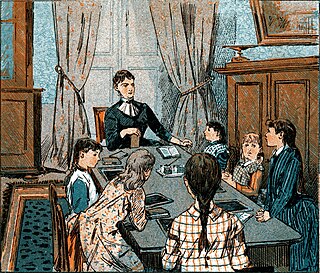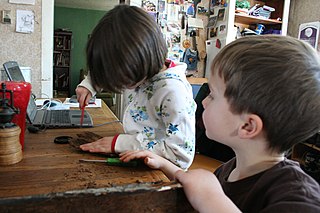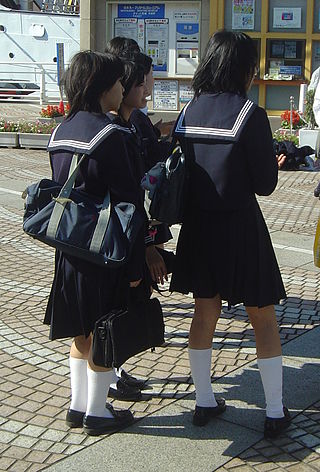Related Research Articles
Educational psychology is the branch of psychology concerned with the scientific study of human learning. The study of learning processes, from both cognitive and behavioral perspectives, allows researchers to understand individual differences in intelligence, cognitive development, affect, motivation, self-regulation, and self-concept, as well as their role in learning. The field of educational psychology relies heavily on quantitative methods, including testing and measurement, to enhance educational activities related to instructional design, classroom management, and assessment, which serve to facilitate learning processes in various educational settings across the lifespan.

Homeschooling or home schooling, also known as home education or elective home education (EHE), is the education of school-aged children at home or a variety of places other than a school. Usually conducted by a parent, tutor, or online teacher, many homeschool families use less formal, more personalized and individualized methods of learning that are not always found in schools. The actual practice of homeschooling varies considerably. The spectrum ranges from highly structured forms based on traditional school lessons to more open, free forms such as unschooling, which is a lesson- and curriculum-free implementation of homeschooling. Some families who initially attended a school go through a deschool phase to break away from school habits and prepare for homeschooling. While "homeschooling" is the term commonly used in North America, "home education" is primarily used in Europe and many Commonwealth countries. Homeschooling should not be confused with distance education, which generally refers to the arrangement where the student is educated by and conforms to the requirements of an online school, rather than being educated independently and unrestrictedly by their parents or by themselves.

Unschooling is an informal learning method that prioritizes learner-chosen activities as a primary means for learning. Unschoolers learn through their natural life experiences including play, household responsibilities, personal interests and curiosity, internships and work experience, travel, books, elective classes, family, mentors, and social interaction. Often considered a lesson- and curriculum-free implementation of homeschooling, unschooling encourages exploration of activities initiated by the children themselves, under the belief that the more personal learning is, the more meaningful, well-understood, and therefore useful it is to the child. While unschooled students may occasionally take courses, unschooling questions the usefulness of standard curricula, fixed times at which learning should take place, conventional grading methods and standardized tests, forced contact with children in their own age group, the compulsion to do homework regardless of whether it helps the learner in their individual situation, the effectiveness of listening to and obeying the orders of one authority figure for several hours each day, and other features of traditional schooling.

Michel Houellebecq is a French author of novels, poems and essays, as well as an occasional actor, filmmaker and singer.

Secondary education in Japan is split into junior high schools, which cover the seventh through ninth grade, and senior high schools, which mostly cover grades ten through twelve.

The Underground History of American Education: A Schoolteacher’s Intimate Investigation Into the Problem of Modern Schooling is a critique of the United States education system by John Taylor Gatto.

In education, a curriculum is broadly defined as the totality of student experiences that occur in the educational process. The term often refers specifically to a planned sequence of instruction, or to a view of the student's experiences in terms of the educator's or school's instructional goals. A curriculum may incorporate the planned interaction of pupils with instructional content, materials, resources, and processes for evaluating the attainment of educational objectives. Curricula are split into several categories: the explicit, the implicit, the excluded, and the extracurricular.

John Taylor Gatto was an American author and school teacher. After teaching for nearly 30 years he authored several books on modern education, criticizing its ideology, history, and consequences. He is best known for his books Dumbing Us Down: the Hidden Curriculum of Compulsory Schooling, and The Underground History of American Education: A Schoolteacher’s Intimate Investigation Into the Problem of Modern Schooling.
A hidden curriculum is a set of lessons "which are learned but not openly intended" to be taught in school such as the norms, values, and beliefs conveyed in both the classroom and social environment. In many cases, it occurs as a result of social interactions and expectations.
This glossary of education-related terms is based on how they commonly are used in Wikipedia articles. This article contains terms starting with G – L. Select a letter from the table of contents to find terms on other articles.
The following outline is provided as an overview of and topical guide to technology:
The following outline is provided as an overview of and topical guide to the human self:

The following outline is provided as an overview of and topical guide to thought (thinking):

Dumbing Us Down: The Hidden Curriculum of Compulsory Schooling (ISBN 086571231X) is a non-fiction book written by American teacher and political communitarian John Taylor Gatto. It has sold over 200,000 copies and consists of a multitude of speeches given by the author. The book proposes that radical change is needed to the American educational system to turn around the negative socialization that children receive.

Our Dumb Animals was an American animal welfare magazine published from 1868 to 1970 by the Massachusetts Society for the Prevention of Cruelty to Animals; it was founded and edited by George T. Angell, the founder of the society.

Anti-intellectualism is hostility to and mistrust of intellect, intellectuals, and intellectualism, commonly expressed as deprecation of education and philosophy and the dismissal of art, literature, and science as impractical, politically motivated, and even contemptible human pursuits. Anti-intellectuals may present themselves and be perceived as champions of common folk—populists against political and academic elitism—and tend to see educated people as a status class that dominates political discourse and higher education while being detached from the concerns of ordinary people.
Student-directed teaching is a teaching technology that aims to give the student greater control, ownership, and accountability over his or her own education. Developed to counter institutionalized, mass, schooling, student-directed teaching allows students to make their own choices while they learn in order to make education much more meaningful, relevant, and effective.
Thomas Jefferson Education, also known as "TJEd" or "Leadership Education" is a philosophy and methodology of education which is popular among some alternative educators, including private schools, charter schools and homeschoolers. It is based on the Seven Keys of Great Teaching and the Phases of Learning. This educational paradigm was popularized through the writing and teaching of Oliver and Rachel DeMille, co-authors of the TJEd resource materials.
Krishna Kumar is an Indian intellectual and academician, noted for his writings on the sociology and history of education. His academic oeuvre has drawn on multiple sources, including the school curriculum as a means of social inquiry. His work is also notable for its critical engagement with modernity in a colonized society. His writings explore the patterns of conflict and interaction between forces of the vernacular and the state. As a teacher and bilingual writer, he has developed an aesthetic of pedagogy and knowledge that aspires to mitigate aggression and violence. In addition to his academic work, he writes essays and short stories in Hindi, and has also written for children. He has taught at the Central Institute of Education, University of Delhi, from 1981 to 2016. He was also the Dean and Head of the institution. From 2004 to 2010, he was Director of the National Council of Educational Research and Training (NCERT), an apex organization for curricular reforms in India. He was awarded the Padma Shri by the President of India in 2011.
The word destabilisation can be applied to a wide variety of contexts such as attempts to undermine political, military or economic power.
References
- ↑ Algeo, John; Algeo, Adele (1988). "Among the New Words". American Speech. 63 (4): 235–236. doi:10.1215/00031283-78-3-331. S2CID 201771186.
- ↑ "'Irresponsible' Hodge under fire". BBC News: World Edition. 14 January 2003. Retrieved 24 June 2006.
- ↑ MacLeod, Donald (14 July 2005). "50% higher education target doomed, says thinktank". The Guardian. Retrieved 24 June 2006.
- 1 2 3 Blumenfeld, Samuel L. (May 1993). "The Blumenfeld Education Letter - May 1993: Dumbing Us Down: the Hidden Curriculum of Compulsory Schooling By John Taylor Gatto". The Odysseus Group. John Taylor Gatto. Archived from the original on 11 July 2009. Retrieved 23 February 2009.
- ↑ Lévy, Bernard-Henri; Houellebecq, Michel (2011). Public Enemies: Dueling Writers Take on Each Other and the World . Translated by Frendo, Miriam; Wynne, Frank. New York: Random House. pp. 3–4. ISBN 978-0-8129-8078-3. OCLC 326529237.
- ↑ Fussell, Paul (1983). Class: A Guide Through the American Status System (1st ed.). New York: Summit Books. ISBN 978-0-671-44991-9. OCLC 9685644.
- ↑ McCrum, Robert (12 March 2000). "Raised highbrows". The Guardian.